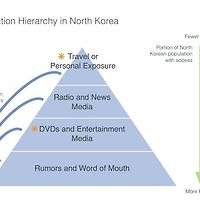A radio tower stands in North Korea. Radio inside the country is limited to state transmissions, but citizens are often able to pick up transmissions from China or South Korea. Photo credit InterMedia.
In post 1 of this series we were introduced to the surge of outside media availability inside North Korea, reported in a recent survey of defectors and others with recent inside experience in North Korea by InterMedia. In this post we’ll go deeper into the role outside media plays inside the isolated country.
DVDs aren’t the only source of information on the outside world. CDs, cassettes, USBs, and even micro-SD cards are flourishing in black market trade, providing additional access to outside films and TV shows. Access typically comes through border residents or through the political and economic elite; the media are then shared with trusted contacts throughout the country. Some people in positions of power can even “order” a show or film brought in and it will make its way across the border through a network of bribery and smuggling.
We’ve spoken mostly about the role of entertainment media, but news media are equally important. Here radio plays a small but special role; there are fewer citizens listening to the radio, but it represents the only available source of real-time information from the outside world. One defector reported monitoring news on food aid, since it affected exchange rates inside the country and had a strong impact on her private business. Another reported on the sophisticated political and economic awareness developed by North Koreans: “When U.S.-North Korea relations deteriorate or when the South Korean army begins military drills, security checks at the border become very rigid. We have to prepare for those situations…. When the border shuts down, exchange rates soar and mineral prices go down. In contrast, imported products become more expensive. It works like a market economy.”
The economic elite, it seems, tend to listen to the radio for “hard content” such as news and analysis that are otherwise impossible to come by in North Korea; likewise the political elite. Less elite listeners tend to be come to radio from the gateway of entertainment media like DVDs; according to the survey, they are usually more interested in “soft content” on the radio: cultural fare that includes music, radio dramas, or even defectors’ letters home.
Clandestine acknowledgment of access to these media is also growing, whether implicit or explicit. A 45-year-old woman who left in 2010 said, “I think now, almost all citizens listen or watch. You can tell when you talk to them… they will use [South] Korean words. In North Korea there is no such phrase as ‘no doubt’ (당연하지) [sic]. When they use a word like that, you think, ‘that person watches too.’”
Possession and consumption of foreign DVDs, music, etc. is still very much illegal, but enforcement seems to be lax, mostly due to the difficulty of policing these more easily hidden goods, a phenomenon clearly visible in the U.S. through the frequency of illegal sharing of music, videos, and books. Furthermore, bribes in North Korea can frequently circumvent punishment, and those surveyed agree that these days very few citizens inform on each other.
Even if you can trust your friends, though, it’s a dangerous pastime. One 25-year-old man describes the experience in detail: “To be honest, watching an episode of a Korean drama is a psychological war. First, I need to completely guard the place where I’m watching the show; I have to block the windows with curtains and closely guard the entrance door. Then I lock the door and listen with an earphone on a low volume so that no one outside can hear what I’m watching. Because there are frequent inspections, I make sure I can move the moment the inspectors come. The whole scene of me watching drama is worthy of a real drama show. Nonetheless, there is the additional excitement that comes from watching in secret.”
Such precautions are almost universal, but for many North Koreans today, the benefits still outweigh the risks. One mobile phone user reported filling a washbasin with water and putting the lid of a rice cooker over his head whenever he made a call. He wasn’t sure if it actually worked or not; still, he noted, he was never caught.
What effect does the growth of foreign media actually have on North Koreans? For answers and more, come back for Part 3.
북한에서의 외부 미디어 제2부
1부에서 탈북자를 인터뷰한 인터미디어의 연구를 통해 북한에서 일어나고 있는 외부정보 노출에 대해 이야기했었다. 이번 기사에서는 외부정보가 북한 사회에 미치는 영향에 대해 알아 보겠다.
DVD만이 외부의 정보를 제공하는 것이 아니다. CD, 카세트, USB, 그리고 SD카드도 북한에서 외부의 영화와 드라마를 볼 수 있게 한다. 이러한 것은 국경지역이나 경제적, 정치적인 상류층을 위해 밀수된다. 그리고 이 미디어정보는 서로 신뢰하는 지인들끼리 공유된다. 권력이 있는 자들은 원하는 드라마나 영화를 “주문”하여 밀수 또는 뇌물로 받아서 시청하는 경우가 있다.
우리는 이전 기사에서 재미를 위한 미디어 정보를 살펴봤지만 뉴스정보 또한 중요하다. 뉴스를 전달하는데 라디오는 작지만 아주 중요한 역할을 한다. 라디오를 듣는 주민들의 수는 적으나 실시간으로 외부정보를 접할 수 있는 것은 라디오 뿐인 것이 사실이다. 한 탈북민은 환율에 많은 영향을 미치는 식량 원조에 대한 뉴스를 자주 들어 자신의 사업에도 큰 도움이 되었다고 한다. 또한 탈북민은 북한주민들의 정치적 그리고 경제적인 의식이 더욱더 성장하였다고 말한다: “북미 관계가 악화되거나 한국에서 군사 훈련이 시작되면 북한 국경 경비는 더욱 엄격해진다. 우리는 이러한 상황에 대비해야 한다. 국경이 닫히면 환율이 오르고 수입품은 더욱 비싸진다. 시장경제와 똑같다.”
정치적 그리고 경제적인 상류층은 북한에서 접할 수 없는 뉴스나 분석을 위해 라디오를 듣는 듯 하다. 인터미디어의 연구결과에 의하면 그 외의 사람들은 음악, 라디오, 드라마, 또는 탈북민들의 집으로 오는 편지와 같은 내용을 선호 한다고 한다.
이러한 미디어 내용물에 대한 접촉도 알게 모르게 드러나고 있다고 한다. 2010년에 탈북한 한 45살 여성은 이렇게 말했다: “요즘은 모든 사람들이 외부 미디어를 보고 듣는 것 같다. 얘기를 하면 알 수 있다. 한국 단어를 사용한다든지 말이다. 북한에는 ‘당연하지’라는 말을 사용하지 않는다. 그런 단어를 사용했을 때 ‘아.. 저 사람도 보는구나’라고 생각한다.”
물론 북한에서 외부매체를 소유하는 것은 불법 행위이다. 하지만 DVD나 USB와 같은 것은 숨기기 쉬워 잡히는 일이 드물다고 한다. 또한 뇌물로도 처벌을 면할 수 있고 요즘은 서로 고발하는 일도 줄어 들었다고 한다.
그럼에도 불구하고 외부정보를 보고 듣는 것은 위험하다. 25살 탈북민은 이렇게 설명했다: “솔직히 한국 드라마를 보는 것은 심리적 전쟁이다. 첫째로는 드라마를 볼 장소를 확실히 점검해야 한다. 창문은 커튼으로 가려야 하며 문도 잘 봐야 한다. 문을 잠그고 이어폰을 꽂아 아무도 안 들리게 소리를 제일 작게 틀어놓고 드라마를 본다. 점검이 수시로 있어 경찰관들이 들이닥치는 순간 움직일 준비를 해야 한다. 이 모든 광경은 드라마의 한 장면과도 같다. 그래도 비밀리에 시청하는 스릴도 나쁘지만은 않다.”
이러한 상황은 거의 모든 이가 겪는다. 하지만 많은 북한 주민들에게는 이득이 위험요소보다 높게 평가된다. 한 휴대폰 사용자는 전화를 걸 때마다 대야에 물을 받고, 머리 위에 밥솥 뚜껑을 얹었다고 한다. 그것이 효과가 있었는지는 모르겠으나 휴대폰을 사용하다가 잡힌 적은 전혀 없었다고 한다.
그렇다면 외부 미디어는 주민들에게 정확히 어떤 영향을 미칠까? 3부에서 살펴보도록 하자.




